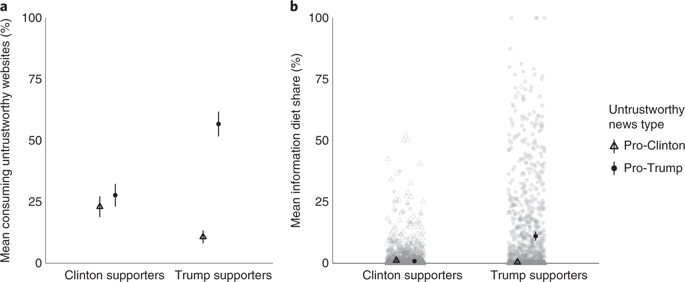当前位置:
X-MOL 学术
›
Nat. Hum. Behav.
›
论文详情
Our official English website, www.x-mol.net, welcomes your feedback! (Note: you will need to create a separate account there.)
Exposure to untrustworthy websites in the 2016 US election.
Nature Human Behaviour ( IF 29.9 ) Pub Date : 2020-03-02 , DOI: 10.1038/s41562-020-0833-x Andrew M Guess 1 , Brendan Nyhan 2 , Jason Reifler 3
Nature Human Behaviour ( IF 29.9 ) Pub Date : 2020-03-02 , DOI: 10.1038/s41562-020-0833-x Andrew M Guess 1 , Brendan Nyhan 2 , Jason Reifler 3
Affiliation

|
Although commentators frequently warn about echo chambers, little is known about the volume or slant of political misinformation that people consume online, the effects of social media and fact checking on exposure, or the effects of political misinformation on behaviour. Here, we evaluate these questions for websites that publish factually dubious content, which is often described as fake news. Survey and web-traffic data from the 2016 US presidential campaign show that supporters of Donald Trump were most likely to visit these websites, which often spread through Facebook. However, these websites made up a small share of people's information diets on average and were largely consumed by a subset of Americans with strong preferences for pro-attitudinal information. These results suggest that the widespread speculation about the prevalence of exposure to untrustworthy websites has been overstated.
中文翻译:

在2016年美国大选中暴露于不信任的网站。
尽管评论员经常警告回声室,但人们对在线消费的政治错误信息的数量或倾向,社交媒体和事实核对曝光的影响,或政治错误信息对行为的影响知之甚少。在这里,我们针对发布可疑内容的网站评估这些问题,这些内容通常被描述为假新闻。2016年美国总统大选的调查和网络流量数据显示,唐纳德·特朗普的支持者最有可能访问这些网站,这些网站通常通过Facebook传播。但是,这些网站平均仅占人们信息饮食的一小部分,并且主要由偏爱习惯性信息的部分美国人消费。
更新日期:2020-04-24
中文翻译:

在2016年美国大选中暴露于不信任的网站。
尽管评论员经常警告回声室,但人们对在线消费的政治错误信息的数量或倾向,社交媒体和事实核对曝光的影响,或政治错误信息对行为的影响知之甚少。在这里,我们针对发布可疑内容的网站评估这些问题,这些内容通常被描述为假新闻。2016年美国总统大选的调查和网络流量数据显示,唐纳德·特朗普的支持者最有可能访问这些网站,这些网站通常通过Facebook传播。但是,这些网站平均仅占人们信息饮食的一小部分,并且主要由偏爱习惯性信息的部分美国人消费。



























 京公网安备 11010802027423号
京公网安备 11010802027423号